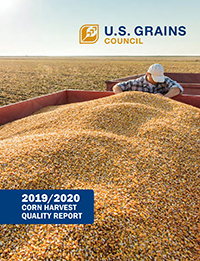After one of the United States’ most challenging growing seasons in history, that included weather-related planting delays, delayed crop maturation and early rains and snows during harvest, the U.S. Grains Council (USGC) has published its ninth annual Corn Harvest Quality Report, a representative view of the quality of corn assembled for export, collected as it enters the international merchandising channels.
The report is based on 623 samples collected from inbound farm-originating trucks at harvest.
“As industry stakeholders and international buyers make decisions about purchase contracts and processing needs for corn for feed, food or industrial use, corn quality information becomes critical,” said Kurt Shultz, USGC senior director of global strategies. “Reports like the Council’s crop quality reports provide transparency about crop conditions and consistently reinforce that the United States is the world’s most reliable supplier of good quality corn.”
This season’s growing conditions forced some producers to harvest at relatively high moisture levels that have led to lower-than-average test weights, slightly higher stress crack incidences and higher broken corn and foreign material (BCFM) as compared with last year’s corn crop.
A forthcoming companion report – the 2019/2020 Corn Export Cargo Quality Report – will focus on export cargo samples collected from corn shipments undergoing federal inspection and grading processes at export terminals. It will provide information on grading, handling and how U.S. corn is moved and controlled through export channels.
The reports offer reliable information on U.S. corn quality from the farm to the customer based on transparent and consistent methodology. They each give an early view of grading factors established by the U.S. Department of Agriculture (USDA), moisture content and other characteristics not reported elsewhere.
The Council’s global staff and grower-leaders will share the results of the first report in a series of crop quality seminars around the world, beginning in Taiwan in January. These outreach activities help establish clear expectations with buyers and end-users regarding the quality of corn this marketing year. During these events, crop quality information is accompanied by presentations on U.S. corn grading and handling.
“Successful market development and outreach efforts, like the corn quality roll out presentations, demonstrate the return on investment for the efforts of the Council and our partner organizations,” Shultz said. “It allows our experts to answer questions directly about the efficacy of this year’s crop and to continue to offer an open line of communication between producers and end-users who want what we have to offer.”
Additional roll-out events are scheduled in January as follows:
- Taiwan – Jan. 6-10, 2020
- South Korea – Jan. 12-18, 2020
- Southern Mexico – Jan. 13-17, 2020
- Northern Mexico – Jan. 13-17, 2020
- Japan – Jan. 18-25, 2020
- South America (Colombia, Peru) – Jan. 19-24, 2020
- Central America (Cost Rica, Dominican Republic, Guatemala) – Jan. 20-25, 2020
- Middle East, Africa and South Asia (Cyprus) – Jan. 22-24, 2020
“The Council’s quality reports can be compared across time, enabling buyers to make well-informed decisions as they purchase U.S. corn,” Shultz said.
Read all nine years of USGC corn harvest quality and corn export cargo quality reports.
About The U.S. Grains Council
The U.S. Grains Council develops export markets for U.S. barley, corn, sorghum and related products including distiller’s dried grains with solubles (DDGS) and ethanol. With full-time presence in 28 locations, the Council operates programs in more than 50 countries and the European Union. The Council believes exports are vital to global economic development and to U.S. agriculture’s profitability. Detailed information about the Council and its programs is online at www.grains.org.

